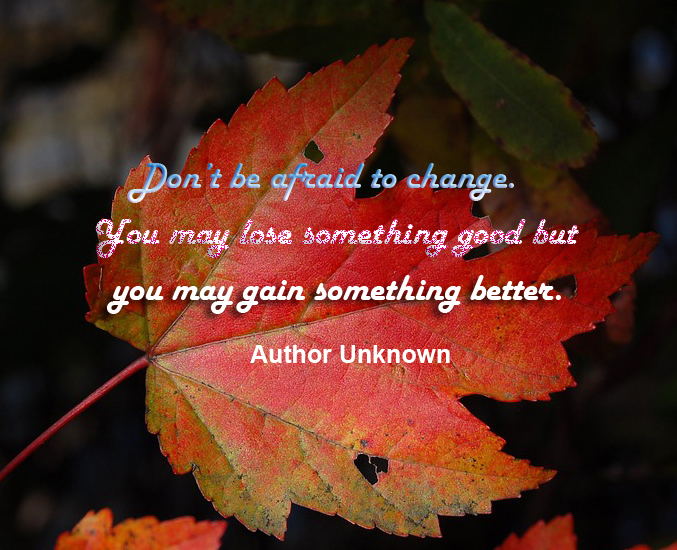
Uomo Universale
I am a creature of habit. I have the same morning routine: Snooze my alarm 3 times, turn on the radio, wish I could sleep in, roll out of bed, brush my teeth, feed my cat, and hope I remembered to put clothes on before stumbling out the door. I take the same route to work, eat the same foods, visit the same stores, and watch the same shows. And then I wonder why I feel bored and unfulfilled. The problem is, I like change in small doses, under my terms. Thrust something new into my life on some idle Tuesday and I’ll panic. It took me a year to get used to a new city and home and sometimes, I still feel a little disoriented and wonder how the heck I got here.
So why is it that some people not only thrive on change, they purposely seek it out? You know, those people who don’t even bat an eye when venturing into the unknown. I had a friend who lived paycheck to paycheck, not knowing if or when her car would be repossessed. Didn’t bother her one bit. I’ve had two former colleagues spontaneously quit their job without lining up another one. “I’ll just wing it,” one said. “I’m going to relax, live off my savings for a little while, and see where life takes me.” My brother woke up one day and decided to move to Australia for 4 months. What’s the most exciting new thing that I’ve done recently? Buy a new bathroom cleaner.
Embracing change is more than just a hunger for adventure – it’s a matter of personality.
When we looked at data from people who took our Big Five Personality Test, we zoned in on two distinct groups: Those who adapt easily to change and those who don’t. Here’s where they differ:
- Not surprisingly, 66% change-adapters (vs. 23% of change-avoiders) go out of their way to try new things. This can be anything from a new route to work, a new restaurant, or even a totally new career.
- 81% of change-adapters (vs. 48% of change-avoiders) are broad-minded. They seek out different perspectives of the world from different people, and are mentally flexible.
- 61% of change-adapters (vs. 18% of change-avoiders) enjoy meeting new people. They are outgoing and friendly.
- 89% of change-adapters (vs. 50% of change-avoiders) have an intense hunger for knowledge. When a topic interests them they will learn everything they can about it from as many sources as they can.
- 84% of change-adapters (vs. 52% of change-avoiders) continuously strive toward self-improvement. They believe that learning and development is a lifelong process, and that there is always room to grow, be it personally, professionally, psychologically, or spiritually.
- Along the same lines, 64% of change-adapters (vs. 38% of change-avoiders) set the bar high for themselves. They don’t just try to meet expectations, they strive to exceed them.
- 87% of change-adapters (vs. 40% of change-avoiders) have strong, solid self-esteem. They recognize their value, have a healthy dose of self-respect, and believe in themselves.
- 78% of change-adapters (vs. 42% of change-avoiders) nurture their creativity. They are innovators who are not afraid to be unconventional, and who make it a point to think outside the box.

- Rather than depending on others to motivate them, 72% of change-adapters (vs. 40% of change-avoiders) are self-motivated. Even when it comes to difficult or unpleasant tasks, they are able to find the incentive from within to move forward.
- Similarly, 85% of change-adapters (vs. 55% of change-avoiders) are driven to succeed. They won’t stop until they finish what they set out to do.
- 51% of change-adapters (vs. 22% of change-avoiders) like to be kept busy. The hate being left idle and are always working toward a goal or objective.
- 72% of change-adapters (vs. 52% of change-avoiders) tackle each task they take on with eagerness and dedication, no matter how inconsequential it is.
- 76% of change-adapters (vs. 32% of change-avoiders) are good under pressure. They are even-keeled and can handle stress.
- 52% of change-adapters (vs. 22% of change-avoiders) make it a point to pick their battles. They have learned to let go of the little things that are just not worth worrying about.
- 71% of change-adapters (vs. 50% of change-avoiders) take pride in being different. They like standing out from the crowd.
- Despite their tendency to be spontaneous and to seek out the new and unknown, the majority of change-adapters (68%) are actually quite content with their life (vs. 32% of change-avoiders). This may be because they always have something new and exciting to pursue, and a life with purpose contributes to life satisfaction.
Although we can avoid some changes, the world will continue to progress with or without us. When change is thrust upon you – job loss, divorce, a new addition to the family, new technologies or business models at work – the only thing you can do is adapt; otherwise, you’ll be left behind. Case in point: One-hit wonders, Blockbuster videos, and Polaroid cameras.
The main reason why we avoid change is fear: The fear of not being able to cope, of losing the comfort of familiarity, of ambiguity and the unknown, and of pushing our boundaries and stepping outside our comfort zone. But here’s the thing about change: The only way you will learn to adapt is to dive into those mystery waters. And Queendom’s research shows that those who embrace change are actually happier, more flexible, and resilient. You may not always like change but sometimes, it’s the universe’s way of giving you the kick in the butt you really need.

Insightfully yours,
Queen D

